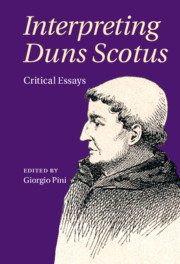Book contents
- Interpreting Duns Scotus
- Interpreting Duns Scotus
- Copyright page
- Contents
- Acknowledgments
- Notes on contributors
- Introduction
- Chapter 1 John Duns Scotus’s life in context
- Chapter 2 The modal framework of Duns Scotus’s argument for the existence of a first cause
- Chapter 3 Duns Scotus on essential order in De Primo Principio and elsewhere
- Chapter 4 Duns Scotus on how God causes the created will’s volitions
- Chapter 5 Duns Scotus on free will and human agency
- Chapter 6 Duns Scotus on the dignities of human nature
- Chapter 7 Duns Scotus on matter and form
- Chapter 8 Duns Scotus, intuitionism, and the third sense of ‘natural law’
- Chapter 9 The bounds of sense: adequacy and abstraction in the later works of Duns Scotus
- Chapter 10 Before univocity: Duns Scotus’s rejection of analogy
- Chapter 11 Analogy after Duns Scotus: the role of the analogia entis in the Scotist metaphysics at Barcelona, 1320–1330
- Bibliography
- Index
Chapter 5 - Duns Scotus on free will and human agency
Published online by Cambridge University Press: 23 December 2021
- Interpreting Duns Scotus
- Interpreting Duns Scotus
- Copyright page
- Contents
- Acknowledgments
- Notes on contributors
- Introduction
- Chapter 1 John Duns Scotus’s life in context
- Chapter 2 The modal framework of Duns Scotus’s argument for the existence of a first cause
- Chapter 3 Duns Scotus on essential order in De Primo Principio and elsewhere
- Chapter 4 Duns Scotus on how God causes the created will’s volitions
- Chapter 5 Duns Scotus on free will and human agency
- Chapter 6 Duns Scotus on the dignities of human nature
- Chapter 7 Duns Scotus on matter and form
- Chapter 8 Duns Scotus, intuitionism, and the third sense of ‘natural law’
- Chapter 9 The bounds of sense: adequacy and abstraction in the later works of Duns Scotus
- Chapter 10 Before univocity: Duns Scotus’s rejection of analogy
- Chapter 11 Analogy after Duns Scotus: the role of the analogia entis in the Scotist metaphysics at Barcelona, 1320–1330
- Bibliography
- Index
Summary
This essay focuses on the notion of the created agents’ will not in relation to God’s causality but in order to refine our understanding of what Duns Scotus meant by ‘freedom’. Unlike most of his predecessors, Duns Scotus considered a “synchronic” power for opposites as fundamental to human free will and set out to give a detailed account of the metaphysical makeup of the power through which we possess free will. The author of this essay, however, argues that this cannot be the full story, because Duns Scotus also maintained that freedom is compatible with necessity. To get a clearer picture of Duns Scotus’s overall understanding of freedom, this essay begins by focusing on how Scotus engaged with Anselm of Canterbury’s definition of freedom. After addressing the exact nature of the power for opposites that Duns Scotus frequently associated with freedom, this essay turns to the “formal concept” (ratio formalis) of freedom and how it is common to God and creatures. The conclusion is that freedom is for Duns Scotus fundamentally a power for self-determination rather than a power for opposites.
- Type
- Chapter
- Information
- Interpreting Duns ScotusCritical Essays, pp. 102 - 121Publisher: Cambridge University PressPrint publication year: 2022
- 1
- Cited by



